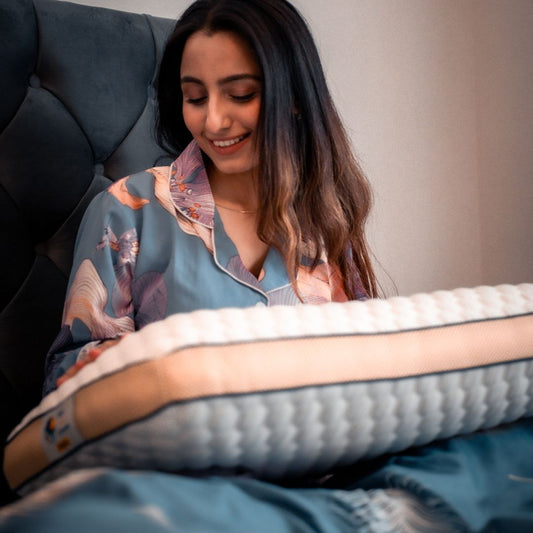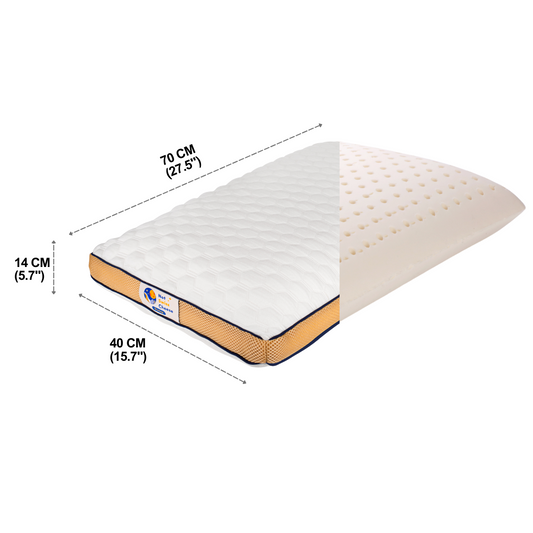Here’s what you need to know:
- Exercise: Just 150 minutes of moderate activity per week can boost blood flow to the brain, rebuild essential brain structures, and reduce the risk of cognitive decline.
- Sleep: Aim for 7–8 hours of quality sleep each night. Good sleep consolidates memories, processes emotions, and reduces your risk of Alzheimer’s.
- Together: Exercise improves sleep, and better sleep enhances brain function. It’s a cycle that supports long-term cognitive health.
Simple steps like walking, yoga, or using a supportive pillow for better sleep can make a big difference. Start small, stay consistent, and prioritize these habits for a sharper mind as you age.
Exercise, Diet, and Sleep: Connections to Brain Health
Exercise and Brain Health
Regular physical activity plays a key role in supporting brain health. Studies show that staying active can help maintain cognitive abilities and improve brain structure and function as we age.
How Exercise Impacts the Brain
Exercise increases blood flow to the brain, which is critical since the brain uses about 20% of the body’s cardiac output to support cognitive functions. Physical activity promotes blood circulation, stimulates the growth of new neurons in the hippocampus, reduces inflammation, and raises levels of brain chemicals like norepinephrine. Dr. Rong Zhang, a neurology professor at UT Southwestern, highlights this connection:
"This is part of a growing body of evidence linking exercise with brain health. We've shown for the first time in a randomized trial in these older adults that exercise gets more blood flowing to your brain."
Types of Exercise for Brain Health
Different forms of exercise offer unique cognitive benefits. Including a variety of activities in your routine can maximize these effects:
| Exercise Type | Brain Benefits | Recommended Amount |
|---|---|---|
| Aerobic | Supports memory and thinking skills | 150 minutes per week at moderate intensity |
| Strength | Helps prevent hippocampus shrinkage | 2–3 sessions per week |
| Dancing | Lowers dementia risk by up to 76% | 2–3 sessions per week |
| Yoga/Tai Chi | Improves focus and cognitive function | 2–3 sessions per week |
Incorporating these exercises into your lifestyle can make a noticeable difference in brain health.
New Research on Exercise and Cognitive Function
Recent studies emphasize the direct link between exercise and brain function. For example, a 2022 study found that older adults who stayed physically active had higher levels of brain proteins that strengthen neural connections. This led to better memory and cognitive performance. Similarly, a UT Southwestern study discovered that moderate exercise (30–40 minutes, 3–5 times weekly) over a year significantly improved brain blood flow.
This research is especially relevant considering that around 20% of adults over 65 experience mild cognitive impairment. Dr. Kaitlin Casaletto from UC San Francisco's Memory and Aging Center encourages action:
"It seems it is never too late to start."
Sleep's Role in Brain Health
Quality sleep is essential for maintaining brain function and cognitive health as we age. Research shows that sleep helps with memory consolidation and emotional processing, both of which are key for long-term cognitive performance.
Sleep Cycles and Brain Function
While we sleep, the brain moves through different stages, each serving a specific purpose. For example, Stage 2 (slow wave) sleep aids in motor skill learning, while REM sleep supports memory and emotional regulation. These processes help:
- Turn short-term memories into long-term ones
- Process and manage emotional experiences
Good sleep strengthens cognitive resilience, showing a clear connection between sleep quality and brain health.
"Even in early adulthood, sleep quality results in measurable changes in cognitive performance by mid-life. The study findings support the importance of sleep quality, uninterrupted, or unfragmented sleep in relation to cognitive performance"
Sleep Problems in Older Adults
As we age, sleep challenges can significantly affect brain health. Here's a breakdown:
| Sleep Issue | Brain Impact | Prevalence |
|---|---|---|
| Chronic Insomnia | 19% higher risk of dementia | Common in adults 60+ |
| Reduced Deep Sleep | Weakens memory consolidation | Normal aging effect |
| Sleep Fragmentation | Brain appears 2.6 years older | Affects most seniors |
| Sleep-Disordered Breathing | Greater risk of cognitive decline | 15–20% of older adults |
Tools and Tips for Better Sleep
"Our findings highlight the importance of addressing sleep problems earlier in life to preserve brain health, including maintaining a consistent sleep schedule, exercising, avoiding caffeine and alcohol before going to bed and using relaxation techniques"
Here are some practical steps for improving sleep:
- Optimize Your Sleep Environment: Keep your bedroom cool and dark. Using a pillow with cooling properties may help maintain a comfortable temperature.
- Stick to a Schedule: Go to bed and wake up at the same time every day, even on weekends, to regulate your internal clock.
- Create a Pre-Sleep Routine: Wind down with calming activities and avoid screens or anything stimulating at least an hour before bed.
If sleep problems persist, keeping a sleep diary can help track patterns and triggers to discuss with a healthcare provider. Combined with regular exercise, these strategies can help protect your brain health over time.
sbb-itb-7fb8e9c
How Exercise and Sleep Work Together
Physical activity and quality sleep work hand in hand to enhance brain function and support cognitive health as we age. Together, they create a powerful combination for improving mental sharpness and overall well-being.
Exercise for Better Sleep
Getting regular exercise can directly improve how well you sleep. Dr. Charlene Gamaldo, medical director at Johns Hopkins Center for Sleep, explains:
"We have solid evidence that exercise does, in fact, help you fall asleep more quickly and improves sleep quality".
Here’s how exercise can impact your sleep:
- Adds more sleep time: Just 30 minutes of exercise daily can lead to 15 extra minutes of sleep.
- Balances sleep-wake cycles: Physical activity helps regulate your internal clock.
- Regulates body temperature: Exercise supports temperature changes that promote better sleep.
- Reduces stress: It lowers stress, which is a common sleep disruptor.
Research suggests moderate-intensity workouts earlier in the day are best for sleep benefits. On the other hand, intense evening workouts lasting over 90 minutes might interfere with your sleep schedule.
Mental Benefits of Exercise and Sleep
When combined, regular exercise and good sleep can boost cognitive abilities. Dr. Vernon Williams, a sports neurologist at Cedars-Sinai Kerlan-Jobe Institute, shares:
"It seems very clear that the more we look and the more it's formally studied, the more we find evidence that optimizing sleep and physical activity/exercise are beneficial - not just for physical health, but for cognitive health and function as well. Anything we can do to improve the brain's functions - including how we think, act, and behave - key aspects of who we are and how we interact with our loved ones and the world in general - is important."
Specific cognitive benefits tied to better sleep include:
| Sleep Component | Cognitive Benefit |
|---|---|
| 30 minutes more REM sleep | Increased attention scores |
| 30 minutes more slow-wave sleep | Improved episodic memory |
| 6+ hours of total sleep | Better memory and attention |
Research on Combined Effects
Studies continue to highlight the lasting advantages of pairing exercise with quality sleep. Dr. Mikaela Bloomberg points out:
"Our findings suggest that the short-term memory benefits of physical activity may last longer than previously thought. Getting more sleep, particularly deep sleep, seems to add to this memory improvement".
For the best results, aim for:
- Moderate aerobic exercise: 150 minutes per week is ideal.
- Consistent timing: Morning workouts may be most effective.
- High-quality sleep: Focus on getting both REM and slow-wave sleep.
This creates a positive cycle - better sleep promotes more physical activity, and regular exercise helps improve sleep. Together, they support long-term brain health and cognitive function.
Steps to Protect Brain Health
Let’s explore practical ways to support your brain health by combining exercise, quality sleep, and long-term habits.
Exercise Plans for Aging Adults
Regular exercise is a cornerstone of brain health. Experts recommend 150 minutes of moderate activity each week. Dr. Scott McGinnis suggests:
"Aim for a goal of exercising at a moderate intensity - such as brisk walking - for 150 minutes per week. Start with a few minutes a day and increase the amount by five or 10 minutes every week until you reach your goal."
Here’s a well-rounded exercise plan:
| Activity Type | Frequency | Examples | Benefits |
|---|---|---|---|
| Cardio | 30 min, 5x/week | Walking, swimming, cycling | Boosts blood flow to the brain |
| Strength Training | 2–3x/week | Resistance bands, bodyweight exercises | Increases muscle strength |
| Balance Activities | Daily | Tai Chi, yoga | Improves coordination and prevents falls |
| Flexibility Work | Daily | Gentle stretching | Maintains mobility |
Steps for Better Sleep
Getting good sleep is essential for brain health. Poor sleep has been linked to a 19% higher risk of dementia. To improve sleep:
- Limit screen time before bed.
- Stick to consistent sleep and wake times.
- Get morning sunlight exposure to regulate your body clock.
A comfortable sleep environment also plays a key role in quality rest.
Choosing a Pillow for Good Sleep
The right pillow can make a big difference in sleep quality by keeping your spine aligned and enhancing comfort. Natural latex pillows are a great option, tailored to different sleeping positions:
| Sleep Position | Recommended Pillow Type | Features |
|---|---|---|
| Back Sleepers | Talalay Latex (Medium-Soft) | Plush support with cooling properties |
| Side Sleepers | Dunlop Latex (Medium-Firm) | Provides firm support for spinal alignment |
| Combination Sleepers | Shredded Adjustable | Customizable loft and firmness |
Natural latex pillows are durable, lasting up to 10 years, and offer benefits like temperature regulation and hypoallergenic properties.
Building Long-Term Health Habits
Dr. Amal Wanigatunga, Assistant Professor in Epidemiology, highlights:
"When you move more, blood flow to the brain improves. With improved blood flow, complex brain areas related to higher-order thinking can work better."
To develop lasting habits that support brain health:
- Start with 5-minute sessions and gradually increase by 5 minutes each week until you reach 30 minutes.
- Pick activities you enjoy to stay consistent.
- Use a wearable device to track your progress.
- Give it at least six months to notice cognitive benefits.
- Staying active can lower the risk of cognitive decline by as much as 38%.
Small, steady changes can add up to a big difference in maintaining and improving brain health over time.
Conclusion: Taking Action for Brain Health
Combining regular physical activity with quality sleep plays a key role in maintaining cognitive health as we age. Dr. Brienne Miner, MD, MHS, Assistant Professor of Medicine (Geriatrics), highlights the importance of a consistent sleep schedule:
"That means going to bed at the same time every night and getting out of bed at the same time every day. That's probably the single best thing you can do to improve your sleep."
Research shows that activities like one-hour exercise sessions spread throughout the week can improve cognitive function. Exercise not only increases blood flow but also enhances sleep, creating a powerful combination for protecting brain health.
To create a solid brain health plan, focus on these three key areas:
- Exercise Regularly: Find physical activities you enjoy and stick to them. Consistent movement supports better brain performance.
- Prioritize Sleep: Good sleep hygiene is essential. Use tools like supportive pillows to ensure proper spinal alignment, and follow earlier tips for creating a sleep-friendly environment.
- Build Lasting Habits: Studies show that those who consistently get insufficient sleep face greater cognitive decline over a decade. Start small, make gradual changes, and aim for consistency.








